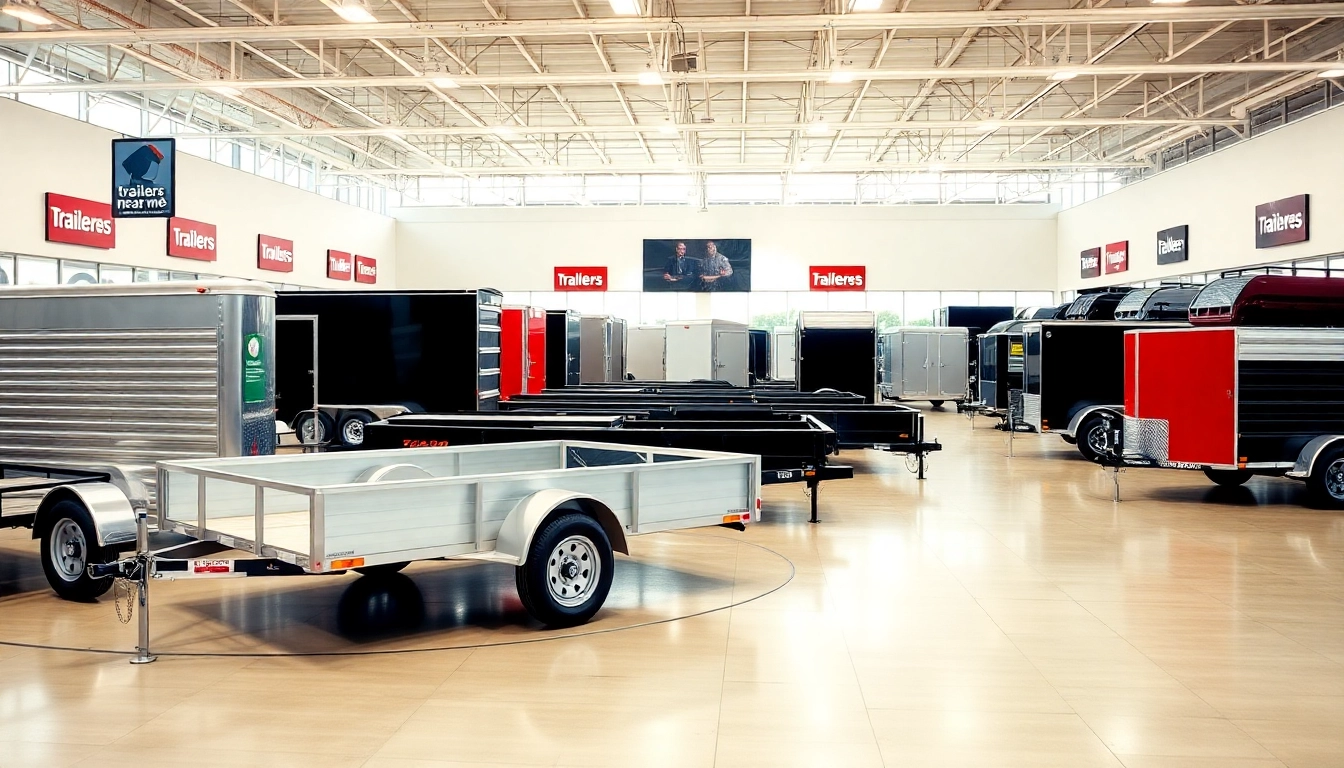Why Choosing the Right Trailer Matters
Finding a suitable trailers near me requires a thoughtful approach. Whether you need a trailer for personal use, business operations, or recreational activities, understanding your specific requirements can significantly impact efficiency and safety in your hauling tasks. Choosing the right trailer can save you time, money, and enhance the functionality of your transport needs.
Understanding Your Needs
Before delving into the different types of trailers, it is crucial to explicitly define your objectives. Are you looking to transport heavy equipment, haul livestock, or carry goods for business? Each scenario demands distinct trailer specifications. For example:
- Equipment Trailers: Ideal for transporting heavy machinery, requiring sturdiness and load capacity.
- Utility Trailers: Versatile for transporting a variety of goods, suitable for both personal and commercial use.
- Livestock Trailers: Designed specifically to transport animals, incorporating essential features for their safety.
Gathering precise information regarding the payload and dimensions is fundamental to selecting a trailer that meets your needs while ensuring compliance with local regulations.
Types of Trailers Available
The market is overflowing with various trailer types to cater to a multitude of requirements. Here’s a breakdown of the most common categories:
- Enclosed Trailers: These fully covered trailers provide protection for your cargo against weather conditions and theft.
- Open Trailers: Commonly employed for transporting goods that don’t require shelter, they are typically lighter and easier to maneuver.
- Dump Trailers: Effective for construction or landscaping tasks, they enable quick unloading of gravel, soil, or other materials.
- Car Haulers: Designed specifically for transporting vehicles, they come equipped with ramps and safety features.
Understanding these categories allows you to narrow down options that align with your specific hauling requirements.
Safety and Compliance Considerations
It is essential to recognize the safety aspects of trailer selection. This includes complying with state and federal regulations regarding trailer weights, brake requirements, and towing capacities. Additionally, utilizing safety equipment such as lights, reflectors, and braking systems not only ensures compliance but also enhances overall road safety.
Regular inspections and maintenance checks are also vital in maintaining compliant and safe operations. These measures help to prevent accidents and prolong the life of your trailer.
Top Features to Look for in Trailers Near Me
Essential Specifications
The specifications of a trailer play a pivotal role in its efficiency. Key considerations include:
- Weight Capacity: Ensure the trailer can handle the maximum load for your intended use.
- Material Quality: Look for trailers built from high-quality materials that enhance durability and performance.
- Dimensions: Verify that the trailer dimensions align with your cargo requirements for optimal use.
Durability and Construction Quality
A durable construction is paramount when choosing a trailer. Factors contributing to a trailer’s durability include:
- Frame Construction: Opt for trailers with solid frames made from steel or aluminum.
- Axle Strength: Robust axles ensure weight distribution is effectively managed during transit.
- Corrosion Resistance: Protective coatings or galvanized metals can extend trailer life by resisting rust and weather damage.
Investing in a well-constructed trailer can save costs on repairs and replacements in the long run.
Customizability and Accessories
Customizability is another aspect to consider, especially if you have specific needs that standard models may not meet. Common accessories include:
- Toolboxes: Provides secure storage for tools and equipment.
- Ramps: Facilitates easy loading and unloading of equipment or vehicles.
- Extra Tie-Downs: Enhances security during transport by allowing better cargo restraint.
Consider how potential modifications can enhance your trailer’s efficiency in fulfilling its purpose.
Where to Find Trailers Near Me
Local Dealerships vs. Online Options
When searching for trailers, you can consult local dealerships or explore online marketplaces. Local dealerships often provide immediate inspection options and industry expertise, while online platforms can offer broader selections and the convenience of comparing prices from home. It is essential to weigh the benefits of both options to make an informed decision.
How to Verify Credibility
Choosing a credible retailer is crucial for purchasing a trailer that meets quality and safety standards. Here are steps you can take:
- Check Reviews: Look for online reviews and testimonials from previous customers.
- Verify Licensing: Ensure the dealership is licensed and recognized within the industry.
- Ask for References: Reputable dealers should have no issue providing customer references.
Doing your due diligence can prevent future complications associated with unreliable purchases.
Comparing Prices and Offers
Price comparison is an essential part of the buying process. Be aware of manufacturers’ suggested retail prices (MSRPs) and factor in shipping or additional fees. Often, there may be financing options or limited-time deals. Keep an eye out for price match guarantees that may be available among dealers.
Developing a list of specifications and correlating them to available options can help in making an informed purchase within your budget.
Financing and Budgeting for Your Trailer
Understanding Costs and Hidden Fees
The total cost of owning a trailer includes more than just the purchase price. Be mindful of the following hidden costs:
- Registration and Licensing: Don’t forget to budget for local licensing fees.
- Insurance: Depending on usage, insuring your trailer might be mandatory.
- Maintenance Costs: Regular maintenance is key to keeping your trailer in good condition.
A budget planner can help you account for these expenses while preventing unwelcome surprises.
Available Financing Options
Exploring financing options can broaden your possibilities for purchasing a trailer. Common options include:
- Dealer Financing: Many retailers offer financing plans that can be customized to suit your needs.
- Bank Loans: Traditional loans from banks and credit unions can be beneficial if you have a solid credit history.
- Peer-to-Peer Lending: In recent years, online lending platforms have gained popularity as viable financing avenues.
Each financing option has its pros and cons; thorough research can lead you to the most beneficial option.
Tips for Negotiating Prices
Negotiation skills can significantly reduce the price of your trailer. A few strategies include:
- Do Your Research: Knowledge about similar trailers will provide leverage in negotiations.
- Be Prepared to Walk Away: Showing you are willing to look elsewhere can compel sellers to offer better terms.
- Discuss Accessories: Rather than just negotiating the base price, consider negotiating the price for added accessories.
Negotiation should be a respectful process; maintaining a positive rapport with the dealer can lead to better results.
Maintenance and Care for Your Trailer
Routine Maintenance Guidelines
To extend the life of your trailer, establish a routine maintenance schedule encompassing:
- Regular Inspections: Check tire pressure, brakes, and lights periodically to ensure they function correctly.
- Cleaning: Keep your trailer free of dirt and debris to prevent corrosion.
- Lubrication: Ensure all moving parts are lubricated to maintain ease of use.
By committing to routine maintenance, you can avoid costly repairs or unsafe conditions.
Repairs and Troubleshooting Common Issues
Common trailer issues may arise; thus knowing how to troubleshoot can save time and money. For example:
- Brakes Not Engaging: Check for brake fluid leaks or a faulty wiring connection.
- Tires Blowing Out: Ensure proper tire pressure and replace any tires that show significant wear.
- Lights Not Functioning: Inspect fuses and wiring for any damage or corrosion.
Maintaining a fully functional trailer ensures safety on the road and reliability for all hauling tasks.
Long-term Care Practices
Long-term trailer care involves proactive practices. Storage matters; during the off-season or when not in use, store your trailer in a dry, ventilated area and cover it to protect it from the elements. Regularly updating your knowledge about each trailer feature will help gauge its condition and performance accurately.
Staying engaged with advancements in trailer technology and maintenance practices can also lead to better care and longevity.




